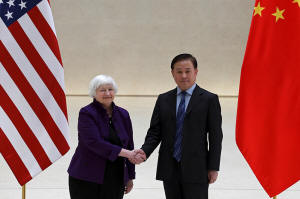Yellen says US will not accept Chinese imports decimating new industries
 Send a link to a friend
Send a link to a friend
 [April 08, 2024] By
David Lawder [April 08, 2024] By
David Lawder
BEIJING (Reuters) -U.S. Treasury Secretary Janet Yellen warned China on
Monday that Washington will not accept new industries being decimated by
Chinese imports as she wrapped up four days of meetings to press her
case for Beijing to rein in excess industrial capacity.
Yellen told a media conference that U.S. President Joe Biden would not
allow a repeat of the "China shock" of the early 2000s, when a flood of
Chinese imports destroyed about 2 million American manufacturing jobs.
She did not, however, threaten new tariffs or other trade actions should
Beijing continue its massive state support for electric vehicles,
batteries, solar panels and other green energy goods.
Yellen used her second trip to China in nine months to complain that
China's overinvestment has built factory capacity far exceeding domestic
demand, while fast-growing exports of these products threaten firms in
the U.S. and other countries.
She said a newly created exchange forum to discuss the excess capacity
issue would need time to reach solutions.
Yellen drew parallels to the pain felt in the U.S. steel sector in the
past.

"We've seen this story before," she told reporters. "Over a decade ago,
massive PRC government support led to below-cost Chinese steel that
flooded the global market and decimated industries across the world and
in the United States."
Yellen added: "I've made it clear that President Biden and I will not
accept that reality again."
When the global market is flooded with artificially cheap Chinese
products, she said, "the viability of American and other foreign firms
is put into question."
Yellen said her exchanges with Chinese officials had advanced American
interests and that U.S. concerns over excess industrial capacity were
shared by allies in Europe, Japan, Mexico, the Philippines and other
emerging markets.
MORE DEMAND
She said a possible short-term solution was for China to take steps to
bolster consumer demand with support for households and retirement, and
shift its growth model away from supply-side investments.
Yellen spoke about the issue at length with Premier Li Qiang and also
met Finance Minister Lan Foan on Sunday. She met People's Bank of China
(PBOC) governor Pan Gongsheng and former vice premier Liu He on Monday.
[to top of second column] |

U.S. Treasury Secretary Janet Yellen and People's Bank of China (PBOC)
Governor Pan Gongsheng shake hands before a meeting in Beijing,
China April 8, 2024. REUTERS/Florence Lo

In a CNBC interview after the meetings, Yellen said she was "not
thinking so much" about trade restrictions on China, as much as
shifts in its macroeconomic environment. But she reiterated she
won't rule out tariffs.
Treasury officials said the U.S. and China were also deepening
co-operation on financial stability issues, with two more
simulations of financial shocks scheduled after a recent exercise on
dealing with the failure of a large bank.
PUSHBACK
China's parliament, the National People's Congress, said in March
the government would take steps to curb industrial overcapacity.
But Beijing says the recent focus by the United States and Europe on
the risks to other economies from China's excess capacity is
misguided.
Chinese officials say the criticism understates innovation by their
companies in key industries and overstates the importance of state
support in driving their growth.
They also say tariffs or other trade curbs will deprive global
consumers of green energy alternatives key to meeting global climate
goals.
State news agency Xinhua quoted Li as saying the U.S. should
"refrain from turning economic and trade issues into political or
security issues" and view the topic of production capacity from a
"market-oriented and global perspective".
Chinese Commerce Minister Wang Wentao voiced more pointed objections
during a roundtable meeting with Chinese EV makers in Paris, saying
U.S. and European assertions of Chinese excess EV capacity were
groundless.
Rather than subsidies, China's electric vehicle companies rely on
continuous technological innovation, perfect production and supply
chain systems and full market competition, Wang said on his trip to
discuss a European Union anti-subsidy inquiry.
(Writing by David Lawder and Marius Zaharia; Editing by Clarence
Fernandez and Miral Fahmy)
[© 2024 Thomson Reuters. All rights
reserved.]
This material may not be published,
broadcast, rewritten or redistributed.
Thompson Reuters is solely responsible for this content.
 |